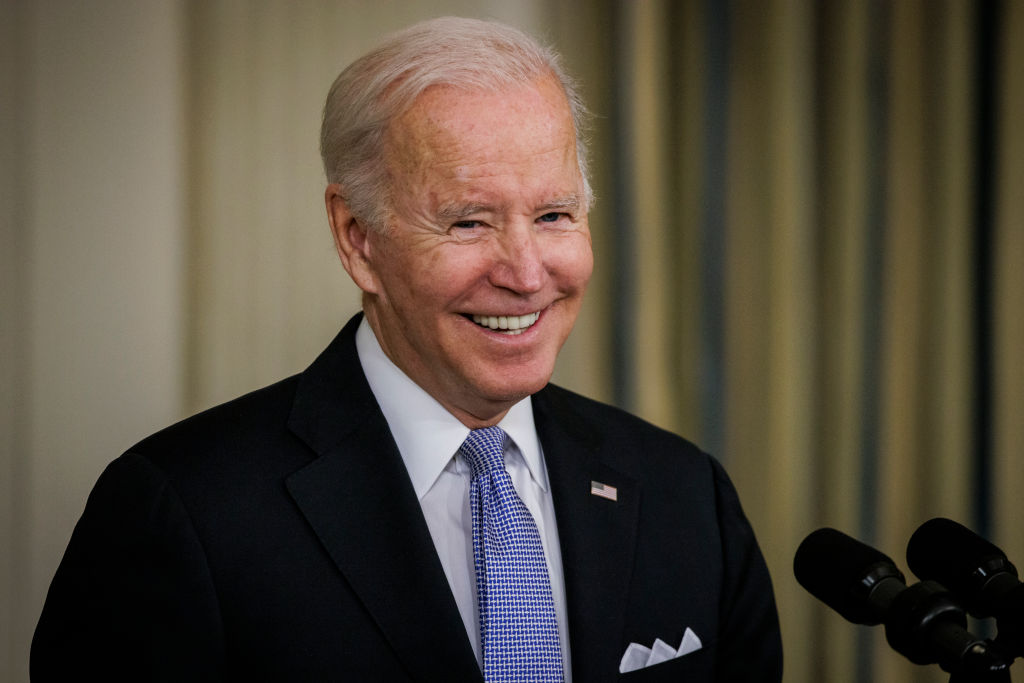The long road to Build Back Better
“It’s finally infrastructure week,” said Joe Biden in a speech on Saturday morning to mark the long-awaited passage of the bipartisan infrastructure bill, which includes $550 billion in new spending. Given the timing of the vote, late on Friday night, it was more a case of infrastructure weekend.
When Biden heralded the legislative win, he also talked up the prospects of the second, more contentious piece of legislation that has been the subject of months of Hill negotiations. “I feel confident that we will have enough votes to pass the Build Back Better bill,” he said.
But once the White House has finished its infrastructure victory lap (made possible only thanks to 13 Republican votes in the House), there are several not-insignificant hurdles to clear if the much-hyped $1.75 trillion package of social spending is to pass the Senate.
A lot depends on the Congressional Budget Office’s verdict on the fiscal consequences of the bill. In a letter assuring progressives that they will back BBB, moderate Democrats said that their support depended on the CBO’s findings.
Second, there’s the possibility that the bill’s immigration provisions, a red line for a small group of Democratic lawmakers, don’t meet the Senate rules for what is permissible in a reconciliation package. There’s also the possibility for further disagreement over the plan to raise the cap on SALT deductions from $10,000 to $80,000.
Complicating things further is the economic big picture: if things head south, or inflation continues to climb before the legislation is passed, Joe Manchin and others might have second thoughts. Add to that the need to find a way of funding the government past December 3 and raise the debt ceiling by that same date.
Democratic leadership allowed themselves a pause and a sigh of relief after Friday’s vote, but a long and winding path lies between them and the passage of Biden’s flagship bill.
*** Sign up to receive the DC Diary in your inbox every weekday ***
The disgraceful 13?
The thirteen Republicans who voted for the infrastructure legislation, in defiance of the instructions from House minority leader Kevin McCarthy, find themselves taking hits.
The frustration isn’t hard to understand: the lawmakers spared Biden a humiliating defeat. But I confess to being surprised at the intensity of the reaction in some quarters. Take National Review’s Philip Klein. Shortly after the vote, Klein accused the thirteen House Republicans of “an utterly disgraceful act” in a no-holds-barred critique of their decision to support the bill.
“Every Republican who voted for this monstrosity who is not already retiring should be primaried and defeated by candidates who will actually resist the left-wing agenda,” writes Klein. “Those who are retiring should be shamed for the rest of their lives. It is not too soon to be asking whether Representative Kevin McCarthy should be ousted from leadership for his inability to keep his caucus together on such a crucial vote.”
I suspect a fired-up Klein will not prove to be especially representative of the reaction to the vote. Many of the yes votes came from lawmakers in swing districts eager to have something to show their voters. By undermining the charge of bloody-minded obstructionism, support for infrastructure spending also makes opposition to the bigger spending bill more persuasive. After all, not so long ago, this was supposed to be a bipartisan infrastructure bill and it commanded the support of nineteen Republican senators.
New lows for Joe and Kamala
Opinion polls have been grim reading for the president lately. But the latest USA Today/Suffolk survey is perhaps the worst yet. It charts a new low for his approval rating, which has sunk to 38 percent. Biden’s unpopularity has strengthened the case for someone other than the president running in 2024. The obvious candidate would be the vice-president. The problem with that plan, though, is that Kamala Harris is even more unpopular than Biden. The USA Today/Suffolk poll puts her approval rating at just 28 percent. Ouch.
Hunter Biden, ‘a great artist for this century’
We head to Manhattan for a masterclass in shameless salesmanship from Georges Bèrges, the gallerist flogging Hunter Biden’s paintings. (He is also the man to whom the White House has effectively outsourced all anti-corruption efforts surrounding the sale.) Hunter’s psychedelic swirls are expected to sell for six-figure amounts, implausibly high figures for a rookie artist were the auction of his work not influence peddling.
But Bèrges has no truck with the suggestion that the paintings’ value derives from anything other than their artistic merit. In an interview with the New York Times, he called one painting a “totem of reflection,” and, apparently with a straight face, said: “Hunter will go down as a great artist for this century. If anything, his father will be known as the father of a great artist.”
What you should be reading today
Bill Zeiser: What is national conservatism?
Ben Sixsmith: Down the QAnon rabbit hole
Grace Curley: Defund the Police will be the death of the Democrats
Ruairí Arrieta-Kenna, Politico magazine: When the unstoppable activists met their match
Pano Kanelos, Common Sense with Bari Weiss: We can’t wait for universities to fix themselves. So we’re starting a new one
Barry Meier, New York: The crippling blow for the Steele Dossier
Poll watch
President Biden Job Approval
Approve: 42.7 percent
Disapprove: 51.3 percent
Net approval: -8.6 (RCP Average)
2022 Generic Congressional Vote
Republicans: 46 percent
Democrats: 38 percent (USA Today/Suffolk)

























